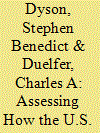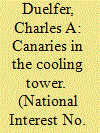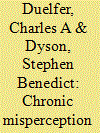| Srl | Item |
| 1 |
ID:
175600


|
|
|
|
|
| Summary/Abstract |
The successful conduct of international relations relies on deducing the intentions of friends and foes. Decisionmakers in one country must make sense of the thoughts and actions of those in other countries.
|
|
|
|
|
|
|
|
|
|
|
|
|
|
|
|
| 2 |
ID:
090196


|
|
|
|
|
| Publication |
2009.
|
| Summary/Abstract |
IN LIGHT of the costly tragedy in Iraq, some have commented that inspections would have been an alternative to war. They were not. It was not that simple. Moreover, even with the most intrusive and extensive inspection system ever implemented, we still did not know the extent of Iraq's WMD capacity. Arms inspections are no substitute for war or political compromise, or good independent intelligence. Too often, too many have expected too much from such mechanisms. Inspections are not a goal in themselves. As the urgency and perils of North Korean and Iranian nuclear programs continue to escalate unchecked, attention repeatedly turns to inspections as the remedy of all ills. Yet, the invasiveness of the Iraq inspections was unique. We will never again be able to cajole another country to the extent we did Baghdad. And still we see the limits that even these intrusive inspections had. But, there are untold lessons to be learned from this bizarre case. More than anything else it goes to show that, in spite of their failings, inspections have a purpose and can be wielded to gain information and to deter WMD programs.
|
|
|
|
|
|
|
|
|
|
|
|
|
|
|
|
| 3 |
ID:
105978


|
|
|
|
|
| Publication |
2011.
|
| Summary/Abstract |
Why did the United States and Iraq find themselves in full-scale conflict with each other in 1990-91 and 2003, and in almost constant low-level hostilities during the years in-between? The situation was neither inevitable nor one that either side, in full possession of all the relevant information about the other, would have purposely engineered: in short, a classic instance of chronic misperception. A combination of the psychological literature on perception and its pathologies with the almost unique firsthand access of one of the authors to the decisionmakers on both sides-the former deputy head of the United Nations weapons of mass destruction inspection mission in the 1990s, the author of the definitive postwar account of Iraqi WMD programs for which he and his team debriefed the top regime leadership, and a Washington insider in regular contact with all major foreign policy agencies of the U.S. government-reveals the perceptions the United States and Iraq held of each other, as well as the biases, mistakes, and intelligence failures of which these images were, at different points in time, both cause and effect.
|
|
|
|
|
|
|
|
|
|
|
|
|
|
|
|